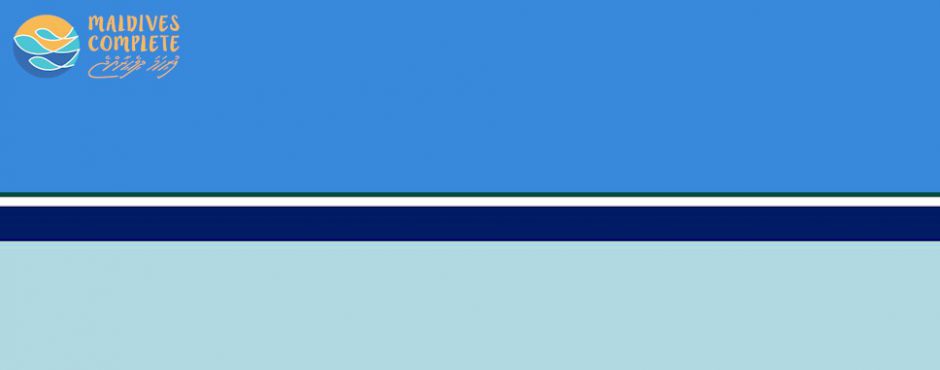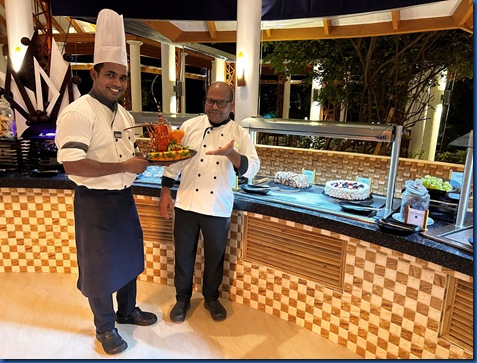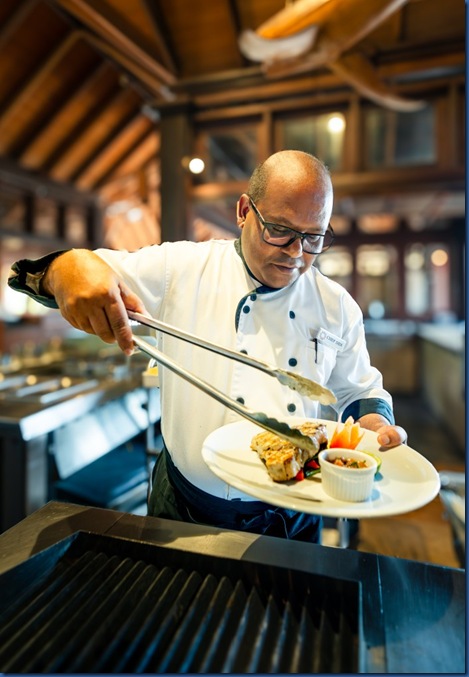As the Maldives tourism industry matures, a number of veterans of the sector stand-out with some serious tenure. As the industry started dominated by ex-pat workers and management, Maldivian national veterans are a bit rarer. Sun Siyam Olhuveli’s Executive Chef Didi Hassan is the longest serving Maldivian I have met in the Maldives. He has been in the business for 32 years, 10 years of which have been at Olhuveli. That pedigree has given him a distinctive perspective on the evolution of the sector, milestone events (especially the tsunami of 2004), and insight into effective resort management and operations. I had the opportunity to sit down with him during my recent visit and glean some of these reflections.
How did you start your career?
I started my career peeling potatoes. I’m not even in the kitchen. I’m at the back door of the kitchen. I took an onion and garlic and started doing that. Then I after another month, I told my chef I wanted to go inside the kitchen. He gave me a chance and allowed me to come into the kitchen. He started by giving me a knife and doing some cutting. But he gave me a very unsharp knife. He said, “If I give you a proper knife, you’re going to cut your hand”…So I started cutting there. I tried to be very fast because my intention was to finish any thing I got to do as quickly as possible and then get something else to do.
How did you develop your culinary expertise?
I started hotel school training in culinary. I did learning little by little. But I had no target, no direction. But my direction was shaped by working in the kitchen. Back then you didn’t have phones, computers and laptops everywhere. We had one or two computers in the front office. If you wanted to do something on them, you had to go get permission. So, in order to learn, I started collecting magazines. When people checked out, they often left magazines behind. And there were lots of food articles. I would cut out all sorts of articles. This is part of learning. I would ask the room boys that if anyone leaves any magazine to give it to me. People would leave books to and any food-related book I would read.
In 1987 I was very young when I married. Me and my wife have had a very good connection from a very young time. Can’t say we were neighbors, but a not far from my home. We went to school and during that time I had some time to go work in a factory. In 1993, We got our first baby. And so that time ,I was here in Olhuveli. This is when I got serious in my work career. I thought about myself what I’m looking for in the industry. I decided my main target was to be an executive chef.
It was a very straightforward goal. Every year I checked how it was happening, what was happening, whether it is progressing or not progressing, figuring what is the next. Anytime I am on duty, I first person in the kitchen and last person in the kitchen. Because I know I have to show myself.
At 31, I became the chef at Oluhevli. We had only three restaurants. One is a buffet restaurant, one is a la carte restaurant and other one is a pool restaurant. At these three restaurants, we have a la carte restaurant and we have teppanyaki. I also worked for 5 years in teppenyaki. Back in 1993, there were no F&B managers like what we have now. But after about 2000, we started getting some high end resorts the operations got more sophisticated.
Do you cook for your family?
When I am visiting home, definitely, I will cook part of it. The children say, “Dad’s home! Please cook curry, chicken curry.” And they will ask for noodles, dry tuna noodles.” I also serve these dishes at the resort. I customize a lot of the local cuisine in the menus.
Do you have any advice for someone looking for a career in F&B?
Right now I manage 133 chefs. When I have interviewers, I ask “What’s your goal? What are you looking for? What is your vision?” You cannot get anything if you don’t put yourself into that goal that only you can achieve. Don’t give up any situation. Don’t look behind, go forward. My advice to anyone coming out of culinary school is first that you have to be punctual. To be on time. If the team isn’t on duty, we just can’t get the job done. Secondly, set your vision and mission as your target to be achieved and work for that.
What is your management style?
I don’t want anyone have a limit. So I don’t keep anyone to limit. You create what you think. Put what is on your mind on the plate or put on the paper and come and discuss it with me. I am looking for interesting dishes.
Do you have a chef’s garden?
The company has three agricultural islands. We decided on things like ladies fingers, eggplants, basils, mint, lemongrass as they are all very easy to grow. You can see that the soil is limited. When you dig it, after one foot, it will be salt water. It’s not easy to grow things, but I have still tried to plant in different things in different places like chili trees and lemon trees. So you become a bit of a farmer as well as a chef.
You were on the island during the tsunami. What was that like?
It was very early morning. And we had a huge departure scheduled with over 100 guests checking out and 90 guests arriving. So I came in very early that morning. I was with my breakfast team and I could see the huge lagoon (there was no Dream Island or Romance Island back then). Then, the whole air became totally different. It was like a feeling. Like a ghost. There was a kind of an unusual sound as well. Still we didn’t know what was going on, but you could see the darkness created. The wind direction changed, but still we are not seeing anything happening. Then when I saw the sea, there was no water. I asked our accountant, Barry, “What is happening?”
Then we had a very heavy strong ‘zoom’ sound. This started to feel a little bit scary. But still we didn’t know what was, but it felt scary. Still there was no water in the lagoon. It was totally empty. Then after that, you saw water start to come up from the sand. The water is boiling up like bubbles.
At that point, the ocean started coming in. First to the lagoon and then onto the island itself. At first, it was about 6 inches deep, but it pushed very strongly. You could not stand up. Then the water rose all the way up to the level of the restaurant roof! At the time, everyone was done with breakfast and people were out and about going to the beach, snorkeling, diving, doing activities. Then the second wave hit. It came in the same way, but this time it came from the side.
When it happened, an announcement was made for all the staff to go to the arrival area. We had almost 90 people on the jetty because the lagoon deck is a bit higher than anywhere else. Then we had security check every room to see if anyone was left there.
Fortunately, everyone was okay. We didn’t have any deaths though we had a few injuries. Immediately, we created a task force team. We divided into 4 or 5 groups. The powerhouse was shut down, but the computer system was still live. Somehow we were able to restart operations immediately.
Then it came to food. Most of our food stores were gone. Our chillers and freezers broke down, but they were floating on top of the water that came flooding in and they stayed sealed so a lot of that food was saved.
We collected all the tin items and checked whether we can use them. We arranged all the food we had. Engineering was working on restoring power. All the kitchen equipment was gone. Then we were able to do some cooking and the staff and the guest were fed together.
At this point we still didn’t know what was going on. We did start sending guests to the airport immediately. Some people had damaged passports from the water, but at that time the majority of rooms didn’t have safes so people kept their passports in the front office which kept them safe. By the following midnight, all the guests had left the island for the airport and only staff remained. But then the government sent guests to us who have gotten stranded. Almost 500 guests. 700 quarantine people in total.
The staff were allowed to go home if they could find a way to travel. We didn’t terminate any staff, but we couldn’t afford to pay them. We said you can stay here and we would feed and house them and give them some pocket money.
The people remaining all volunteered to help. We had a big task with all these things to do. And we had to feed 700 quarantined people.
You could walk freely, but you couldn’t come onto the island. There we police and military guarding the island entrance. We carried the food from the entrance and then we santise it.


